
Building your vocabulary is a powerful way to help boost your foreign language fluency. But cramming vocabulary lists isn’t an effective way to learn. Sure, you might do okay on the quiz in your Spanish or Chinese class, but how much will you really remember two weeks later… or in two years? And since the point of learning a language is to be able to talk to real people, busy learners need a technique that is both efficient for learning and effective at retaining new vocabulary for the long term. That’s where Spaced Repetition comes in. It’s the powerful technique for helping students learn foreign language vocabulary quickly – and ensuring they won’t forget it.
Cramming Doesn’t Work
When foreign language teachers tell you not to cram, they’re onto something. The ineffectiveness of cramming as a technique for long-term learning has been known for a long time. In 1885, the German psychologist Herman Ebbinghaus, published his own “forgetting curve”. He graphed the rate he forgot a list of nonsense syllables (e.g., KOF, NAL, PIF,) that he had just learned.
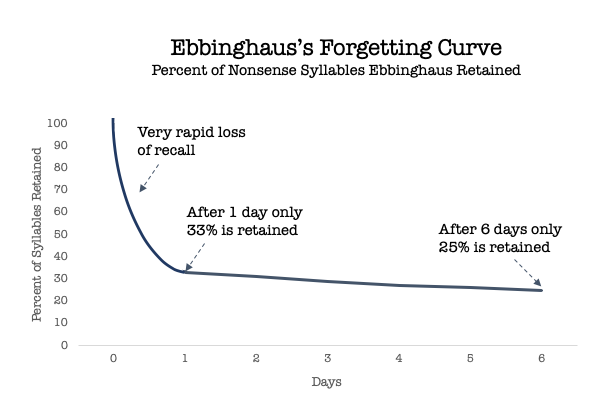
As you can see, the initial drop off is really sharp. Ebbinghaus lost 77% of what he learned in just one day! So when a student feels like they can’t remember what was on a test they crammed for, they’re probably right.

What Ebbinghaus went on to discover is that if he revisited the nonsense syllables he had learned he was able to stave off that memory loss. And each time he revisited the syllables his forgetting curve got a bit less steep – meaning he was able to remember more syllables for longer. So if it’s long term retention students are after, they’re much better spending 5 or 10 minutes with their foreign vocabulary list every day for a week than an hour the night before a quiz.
Spaced Repetition Boosts Learning
Happily, there are ways to boost the effectiveness of that daily study time even further, and that’s with a Spaced Repetition System (SRS). Let’s say a student has 20 new words they want to learn. And let’s say they have 5 minutes a day and 7 days to learn them. They could practice all of the words every day but it wouldn’t be very efficient. They would be spending the same time and energy on the words they’ve already learned as the ones that they’re struggling with. Instead, once they’ve learned a word, they’re better off skipping it for a day or two, and redirecting their focus to the words that they haven’t learned yet.
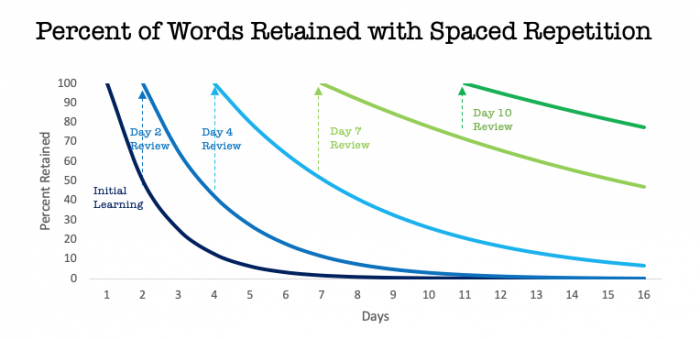
Curiously, skipping a word for a few days will actually help strengthen a student’s ability to remember it in the long term. That’s because when you start to forget a word, your brain has to work a bit harder to recall it, and that extra effort strengthens your memory. The effectiveness of Spaced Repetition was noted in 1932, by British psychologist C.A. Mace, who said that increasing the amount of time between reviews of material improved retention. “Acts of revision should be spaced in gradually increasing intervals, roughly intervals of one day, two days, four days, eight days, and so on.”
Why Spaced Repetition Works
Think about it this way. If you practice a word every day, you don’t really have to work very hard to recall it. It’s like lifting a one pound weight. It’s not a bad thing, but it’s not particularly effective for making you stronger. On the other hand, if you wait until you’ve started to forget a word, until it takes a moment or two to recall it, recalling that word takes more work from your brain. That effort helps lay stronger neural networks for recall. It’s like lifting a five pound weight instead of a one pound weight to build your muscles more. That’s why it is ideal to give yourself increasing ‘gaps’ or time intervals as you practice words: the desired effect is to make your recall neurons work harder.
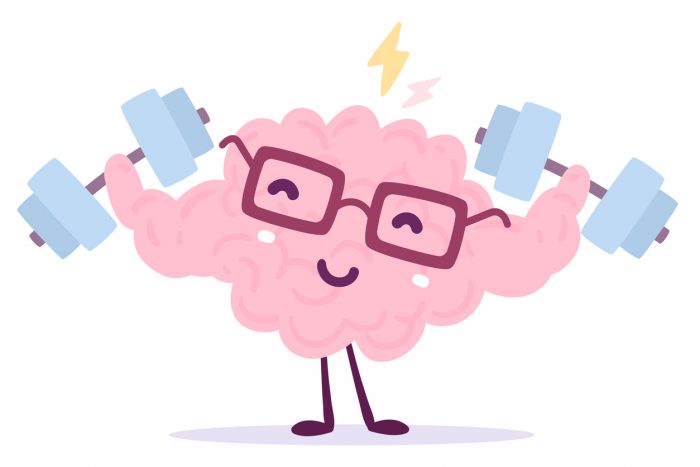
So for students seeking an efficient and effective way to learn vocabulary for the long term a Spaced Repetition System has two benefits:
1. It’s more efficient because it focuses the student’s time on the words they are still struggling with
2. It’s more effective because it gives them an opportunity to start forgetting the words they have learned, making the recall effort harder, in order to strengthen recall for the future.
Spaced Repetition is Easy to Implement
How can students use the power of a Spaced Repetition System (SRS) to accelerate their vocabulary learning and retention? Some students use flashcards and file boxes to help them implement this study technique. Words they are working on learning go in the file for every day practice. Once they’ve learned it, it goes to the every-other-day box. When they get those words right they move to a once-a-week box. If they can remember the word after a week, it moves to a “monthly/before the exam” box.
Nowadays, for most students, Spaced Repetition System (SRS) programs and apps replace file boxes. There’s no need to shuffle around the cards the student can remember – an app will quiz the student on the foreign vocabulary they are learning with increasingly longer gaps for the words they get right.
Spaced Repetition is why good foreign language teachers will give students time to think about an answer, rather than immediately jumping in with a word the student has forgotten. If the student can eventually remember it for themselves, they’ve just strengthened their recall for the future.
PandaTree Launches Word Master Game with Spaced Repetition System
Since PandaTree.com’s launch in 2015, children learning Spanish or Chinese online in a one-on-one lesson with a PandaTree tutor get new words added to their word list during their lesson. Students can practice their personalized new words with fun games between lessons. Now PandaTree.com has launched a Word Master game, powered by a Spaced Repetition System (SRS) algorithm, to increase the efficiency of learning vocabulary. As a student demonstrates the ability to recall a word over longer periods of time (days and weeks), stars indicating the word strength get filled in, until 5 stars, or mastery, is reached. Because Spaced Repetition tests the ability to recall a word over increasingly longer periods of time, it takes several weeks for a word to get to 5 stars.
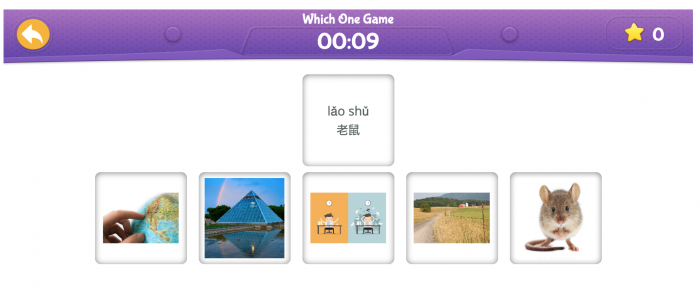
Even once a word has been mastered, it gets retested over increasingly longer time periods. If the student forgets a mastered word, stars drop off, and the word gets tested more frequently until it is mastered again.
Regular Practice is Ideal
How much vocabulary practice is ideal? Five to ten minutes of practice a day with the Word Master game, on most days of the week, is ideal for learning vocabulary efficiently. And since language learning for kids shouldn’t feel like a chore, the game is a fun way to get vocabulary practice in between lessons. During their online tutoring lessons, they’ll be reusing that vocabulary, for a chance to practice in context with another person.
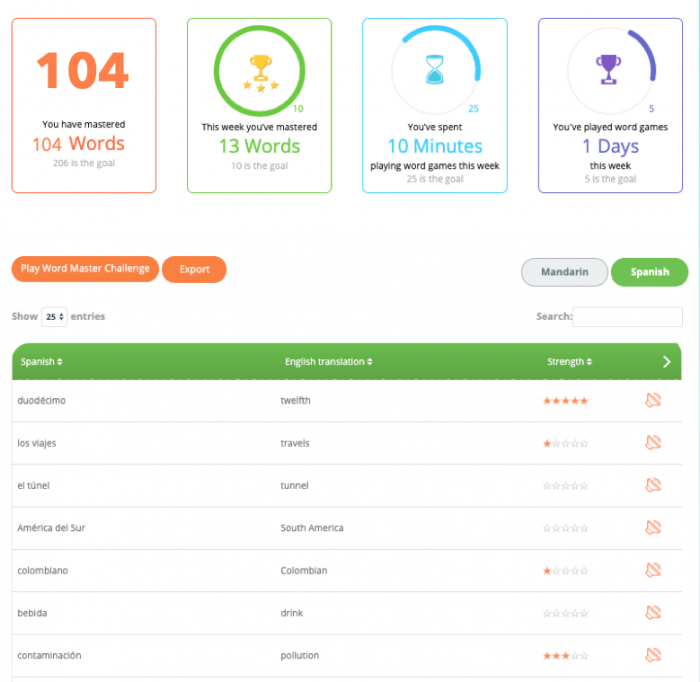
Of course, learning a foreign language requires more than just learning vocabulary. There’s grammar, syntax, and cultural context that also need to be understood. But building vocabulary can accelerate fluency – bringing the opportunity to experience the joy of talking to another person in their language even closer. Using Spaced Repetition is a great way for students to improve the efficiency and effectiveness of learning new foreign vocabulary.
